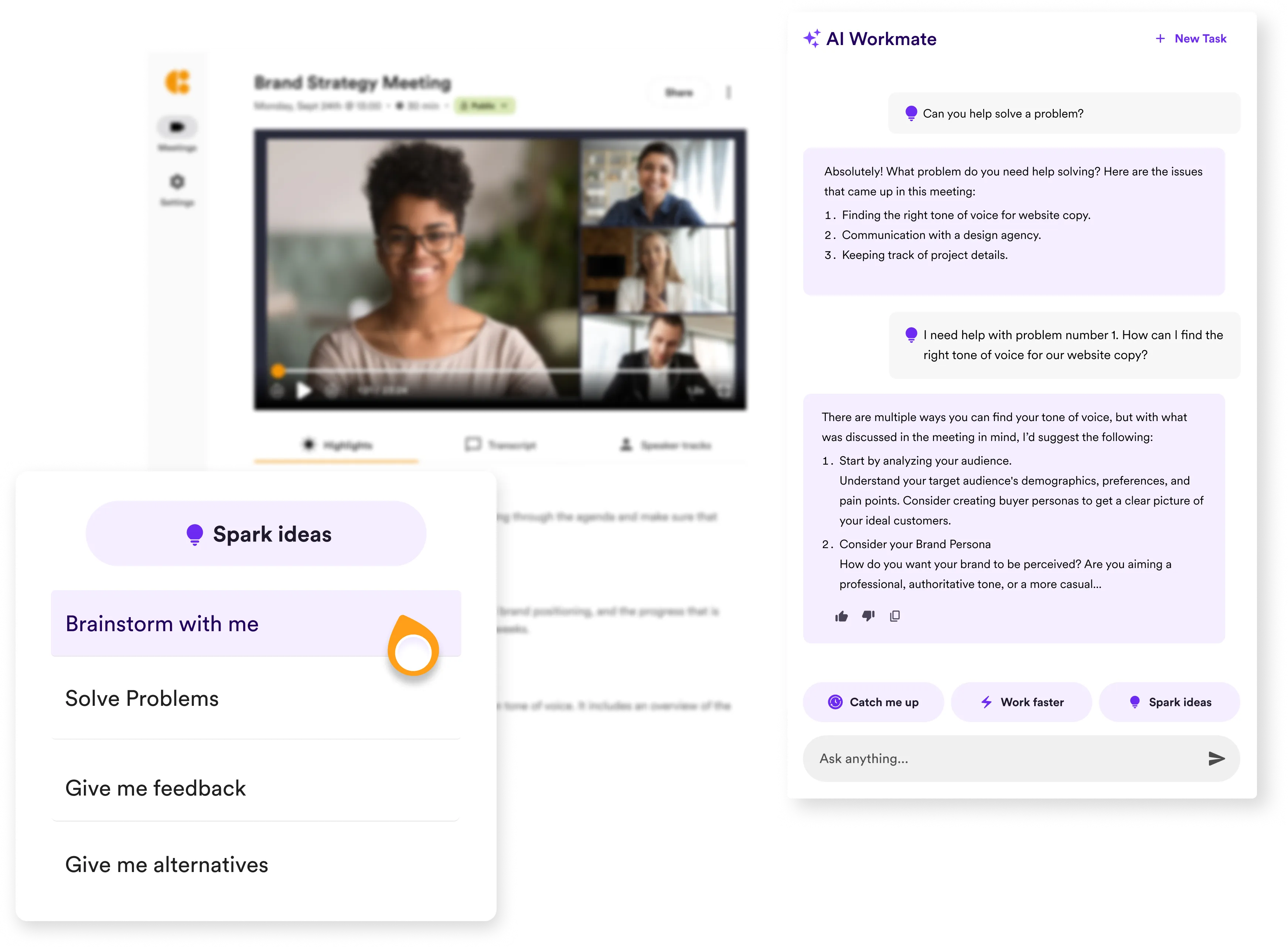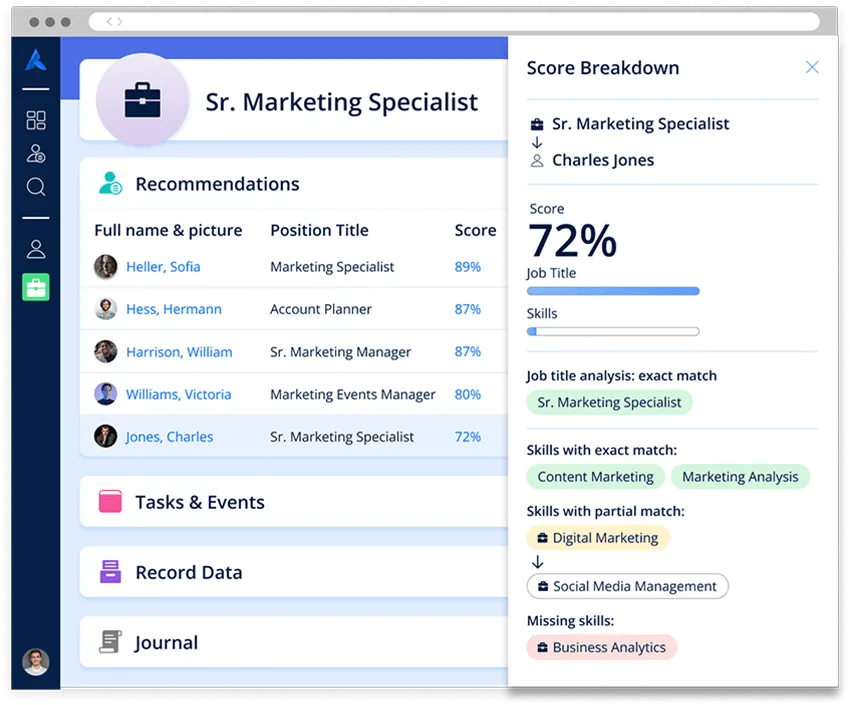Interview Red Flags : a Guide with 16 Examples

Interviews are where you uncover a candidate’s true potential—but also identify any potential issues.
But which signs are the most likely of a candidate who doesn’t fit well with your position ?
Throughout this article, we'll explore the most crucial red flags to watch for during your interviews.
What is an Interview Red Flags ?
Interview red flags are signs or behaviors that indicate a candidate may not be the right fit for your team or company.
They serve as warnings that something might be off, whether it’s related to their qualifications, work ethic, attitude, or cultural alignment.
You might be tempted to overlook a red flag if the candidate’s resume looks great or if they impress you in other areas. That's especially the case with sought-after tech candidates. However, ignoring these warning signs can lead to problems down the line.
However, it’s important to remember that red flags don’t always mean the candidate is entirely unsuitable. Sometimes, they can be an indication of something that needs further probing. For example, if a candidate seems unprepared or doesn’t have clear answers, it might just be nerves. Your goal is to distinguish between occasional, understandable slips and consistent behaviors that indicate deeper issues.
Examples of Preparation Red Flags

Preparation red flags are indicators that a candidate might not be putting in the effort required to succeed in the role. These red flags suggest that they may lack dedication or have a poor work ethic :
1. Lack of Research About the Company
If a candidate cannot clearly articulate what your company does or why they want to work there, it’s a major red flag. This shows that they haven’t taken the time to prepare properly. A well-prepared candidate should be able to speak about your company’s mission, products, and culture with at least a basic understanding.
If they haven’t done their homework, it suggests they may not bring the level of commitment and enthusiasm you’re looking for.
2. Unclear Understanding of the Role
Another red flag is when candidates have a vague understanding of the job they’re applying for. When asked about the responsibilities of the role, they should be able to give a clear answer that demonstrates they’ve read the job description and considered how their skills fit.
If they give an uncertain or generic answer, it suggests they haven’t taken the time to think critically about the role.
3. Arriving Late Without a Valid Reason
Punctuality is a simple but telling indicator of a candidate’s professionalism. If a candidate arrives late to an interview without offering a valid reason, it raises concerns about their reliability and respect for others' time.
Tardiness might be excusable in rare cases if an emergency occurred, but failing to acknowledge it or apologize shows a lack of accountability.
4. Poor Personal Presentation
If a candidate shows up looking disheveled or appears to have made no effort in their appearance, it reflects poorly on their attitude towards professionalism. While the exact dress code can vary depending on the industry and company culture, a lack of basic grooming or attention to appearance suggests a lack of respect for the opportunity or an inability to adapt to different environments.
This could be a sign that they won’t represent your company well, especially in client-facing situations.
Examples of Communication Red Flags

Communication is key to success in almost every role, and how a candidate communicates during an interview can be very telling. Here are some common communication red flags and why they matter:
1. Vague or Evasive Responses
If a candidate provides vague or evasive answers to direct questions, it’s a significant red flag. This kind of behavior can indicate that they either lack the necessary knowledge or are trying to avoid giving an honest answer.
For example, when asked about a challenging situation they faced in a previous role, a candidate should be able to give a clear and concrete example. If their response is overly general or they seem to dodge the question, it might indicate they aren’t being entirely truthful or have difficulty reflecting on their experiences.
2. Interrupting or Dominating the Conversation
A candidate who frequently interrupts you or talks over you during the interview demonstrates a lack of listening skills and respect. Communication is not just about speaking; it’s also about listening.
If a candidate cannot listen attentively or continuously dominates the conversation, it may indicate that they struggle to work collaboratively or respect others' input.
3. Speaking Negatively About Past Employers
It’s important to pay attention to how a candidate speaks about their past employers and colleagues. If they focus heavily on negative experiences or blame others for past issues, it’s a red flag.
While it’s understandable that not all past job experiences are positive, a candidate should be able to discuss challenges in a constructive manner. Constant negativity might indicate that the candidate has difficulty taking responsibility for their role in conflicts or tends to hold grudges, which could impact their ability to contribute positively to your team.
4. Inconsistent Stories or Conflicting Information
If a candidate provides answers that contradict something they mentioned earlier in the interview or on their resume, it’s a major red flag. Inconsistencies could indicate dishonesty or poor attention to detail.
For example, if a candidate claims they have extensive experience with a certain skill but later struggles to discuss it in detail, it suggests they may have exaggerated their qualifications. Consistency is key, and any discrepancies should be addressed directly to determine if it’s a simple misunderstanding or something more concerning.
5. Lack of Enthusiasm or Engagement
A lack of enthusiasm during the interview can also be a red flag. If the candidate seems disinterested, doesn’t ask questions, or gives one-word answers, it’s a sign that they may not be genuinely invested in the opportunity.
Examples of Cultural Fit Red Flags

Cultural fit is just as important as skills and experience when making a hiring decision. Here are some common cultural fit red flags and why they matter:
1. Lack of Alignment with Company Values
A major red flag is when a candidate’s values seem to be at odds with those of your company. During an interview, candidates should be able to relate to and embrace the core values of your organization.
For instance, if teamwork is a core value and the candidate seems overly focused on personal achievements or individual competition, it’s a red flag. Misalignment in values can lead to conflicts, dissatisfaction, and ultimately high turnover.
2. Resistance to Teamwork
If a candidate seems reluctant to talk about their experiences working in a team or shows a preference for working alone, it might be an indicator that they struggle in collaborative environments.
A candidate who doesn’t seem enthusiastic about contributing to a team or speaks dismissively about team efforts may not be the right fit for a role that requires collaboration.
3. Inflexibility or Resistance to Change
In today’s fast-paced work environment, adaptability is a key trait. If a candidate appears rigid or expresses an unwillingness to adapt to new methods, technologies, or changes in general, this could be a red flag.
For example, if a candidate repeatedly emphasizes a preference for doing things the “traditional” way, it might indicate they will resist new initiatives or struggle with changes.
Examples of Career and Motivation Red Flags

Career and motivation red flags can help you identify whether a candidate is genuinely interested in the role and your company, or if they are simply looking for a temporary stopgap :
1. Short Job Tenures Without Clear Reasons
Frequent job changes without a reasonable explanation can be a red flag. If a candidate has a history of moving from job to job every year or so, it’s worth digging deeper into why.
While there can be legitimate reasons for short tenures—such as layoffs or contract work—if the candidate struggles to explain why they left each role or their reasons seem inconsistent, it may indicate a lack of commitment or an inability to adapt to workplaces.
2. Lack of Clear Career Goals
Candidates should have a vision of where they want their career to go, even if it’s not overly detailed. If a candidate seems uninterested or unable to articulate their career goals, it’s a red flag that they may lack motivation or a sense of purpose.
3. Overemphasis on Compensation and Benefits
While it’s natural for candidates to be interested in compensation, an overemphasis on salary and perks during the interview process can be a red flag.
If the candidate asks more questions about benefits than about the role or the company culture, it could indicate that they are primarily motivated by money rather than the work itself. This lack of intrinsic motivation might mean they will be less engaged or willing to go the extra mile when the job gets challenging.
4. Inability to Explain Career Transitions
Career changes can be positive and often bring new perspectives and skills to a role. However, if a candidate cannot clearly explain their career transitions or provides vague responses, it’s a red flag. This may indicate that their career moves were unplanned or made out of necessity rather than genuine interest or growth. A well-considered career transition should be backed by a clear reason, such as pursuing new skills, interests, or opportunities for advancement.
How to Evaluate the Severity of Red Flags

Identifying red flags during an interview is one thing, but knowing how to weigh their significance is equally important. Not every red flag is a dealbreaker; some may simply warrant a deeper discussion, while others can indicate that a candidate truly isn’t a good fit. Here’s how to evaluate the severity of the red flags you encounter.
Context Matters
Always consider the context when a red flag arises. For instance, if a candidate arrives late but has a legitimate reason (like unforeseen traffic or an emergency), it may not be a major issue, especially if they communicated their situation promptly. On the other hand, a lack of any reasonable explanation for tardiness may point to a deeper lack of professionalism.
Pattern vs. Isolated Incident
One of the most critical aspects of evaluating red flags is determining if they are part of a pattern or a one-time occurrence. For example, if a candidate seems nervous and struggles to answer one question but is articulate in other responses, it may simply be a case of interview jitters. However, if a candidate consistently gives vague answers or avoids answering questions directly, this indicates a pattern that suggests deeper issues such as a lack of knowledge, experience, or transparency.
Severity of Impact
Not all red flags carry the same weight. Some red flags, such as a lack of specific technical skills, may be mitigated through training if the candidate is otherwise a great fit for the company culture. On the other hand, red flags related to integrity, such as dishonesty or a lack of accountability, are much harder to overlook.
Candidate’s Willingness to Improve
Another factor to consider is the candidate's willingness to acknowledge and address their red flags. If a candidate is open to feedback and demonstrates a willingness to learn or improve, some red flags may be worth overlooking. For example, a candidate who admits to struggling with public speaking but shares how they are actively working on it shows a growth mindset.
Alignment with Role Requirements
The relevance of a red flag often depends on the specific role you are hiring for. A candidate’s lack of enthusiasm for teamwork might not be as critical for a role that requires mostly independent work, but it would be a significant concern for a highly collaborative position. Evaluate how the red flag aligns with the specific demands and expectations of the role.
Noota: Never Miss Any Crucial Details in Your Interviews
.png)
Spotting red flags during interviews is essential, but it requires sharp attention and a consistent approach. Noota's AI meeting assistant can be a game changer for ensuring that you identify key details without missing anything crucial :
- Conversation Intelligence : Noota’s conversation intelligence feature allows you to analyze candidate behaviors objectively. It uses advanced metrics like the speak-to-listen ratio and emotional tone detection to offer deeper insights into how candidates communicate.
- Record and Transcribe Answers Automatically :Taking notes during an interview is challenging, especially if you want to stay present and actively engaged with the candidate. Noota automatically records and transcribes interviews in real-time, so you don’t have to worry about missing important details. After the interview, Noota generates structured summaries highlighting key takeaways, including the candidate's strengths, areas for improvement, and any potential red flags.
- Seamless Team Collaboration : Hiring is a collaborative effort, and Noota makes it easy to share interview insights with your hiring team. You can quickly distribute structured summaries and transcripts, ensuring that everyone involved in the decision-making process has access to the same information. By sharing the full interview context, including both the transcript and highlights, your team can discuss and evaluate candidates more effectively.
Want to not miss any crucial detail and ensure the right hiring decisions? Try Noota for free.
Leverage your Interview Data
AI interview notes, scorecard, follow-up, ATS integration, and more...
Related articles

Forget note-taking and
try Noota now
FAQ
In the first case, you can directly activate recording as soon as you join a videoconference.
In the second case, you can add a bot to your videoconference, which will record everything.
Noota also enables you to translate your files into over 30 languages.

.svg)
.svg)
.webp)

.png)


.svg)
